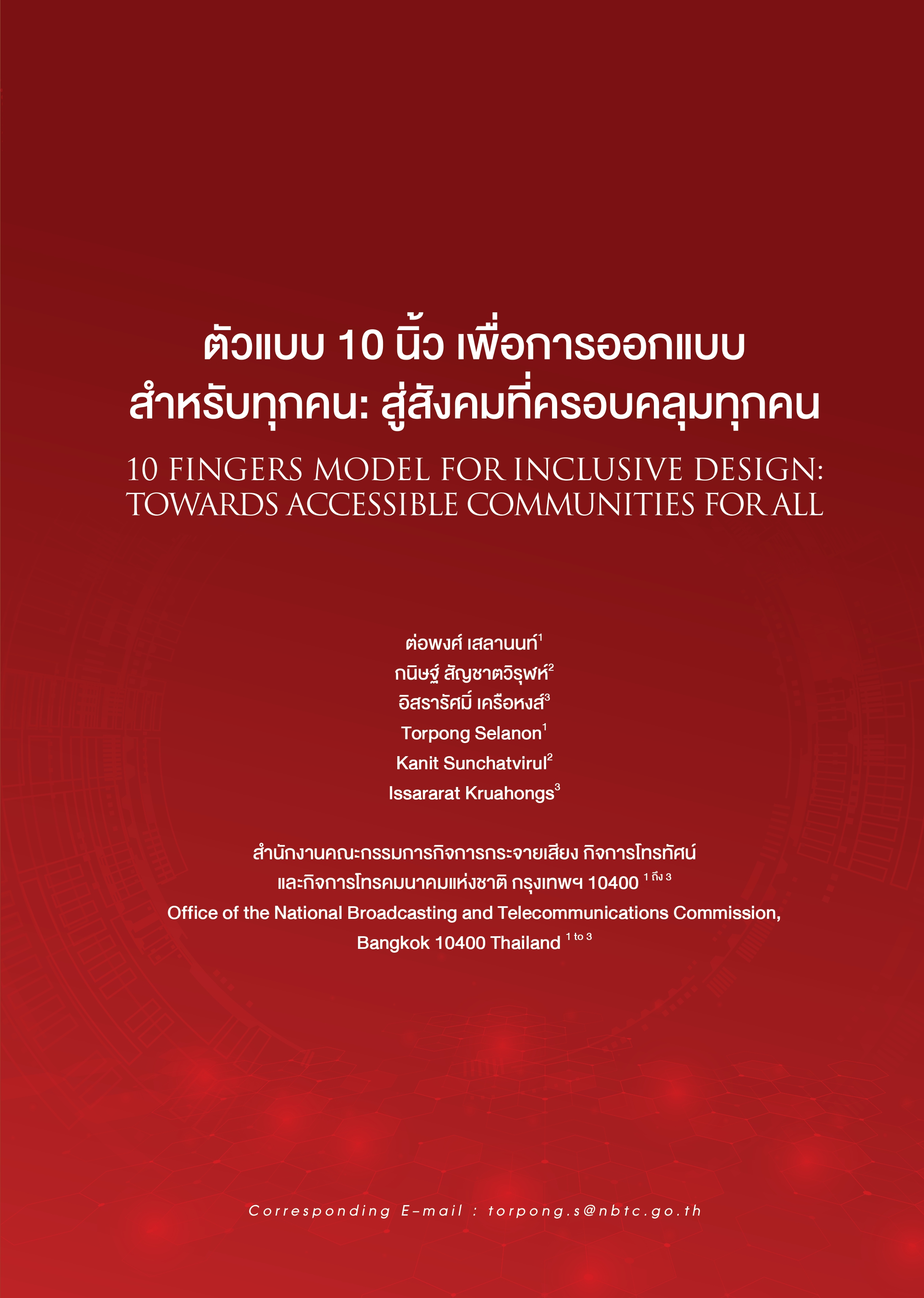ตัวแบบ 10 นิ้ว เพื่อการออกแบบสำหรับทุกคน: สู่สังคมที่ครอบคลุมทุกคน
คำสำคัญ:
การออกแบบสำหรับทุกคน, ตัวแบบ 10 นิ้ว, ความเท่าเทียม, การเข้าถึง, สังคมไทยบทคัดย่อ
การออกแบบสำหรับทุกคน เป็นแนวคิดในการสร้างสังคมที่เท่าเทียมและเข้าถึงได้สำหรับทุกคน บทความนี้มีวัตถุประสงค์ในการนำเสนอตัวแบบ 10 นิ้ว เพื่อการออกแบบสำหรับทุกคน โดยใช้นิ้วมือทั้ง 10 เป็นสัญลักษณ์แทนองค์ประกอบสำคัญที่ต้องพิจารณาในกระบวนการออกแบบ ประกอบด้วย 5 องค์ประกอบด้านสภาพแวดล้อมทางกายภาพ ได้แก่ การออกแบบชุมชนเมือง การออกแบบภูมิทัศน์ การออกแบบสถาปัตยกรรม การออกแบบภายใน และการออกแบบผลิตภัณฑ์ และ 5 องค์ประกอบด้านเทคโนโลยีที่มุ่งเน้นมนุษย์ ได้แก่ ผู้ใช้ ทักษะของผู้คน อุปกรณ์อัจฉริยะ แอปพลิเคชันซอฟต์แวร์ และการเชื่อมต่อ โดยศึกษาจากเอกสารที่เกี่ยวข้อง ซึ่งเผยแพร่ระหว่าง พ.ศ. 2543-2566 ผลการศึกษารวบรวมพบว่า การออกแบบสำหรับทุกคนมีผลกระทบเชิงบวกต่อคุณภาพชีวิต เศรษฐกิจ การมีส่วนร่วมในสังคม นวัตกรรม และสิ่งแวดล้อม โดยช่วยเพิ่มคุณภาพชีวิตของผู้สูงอายุและคนพิการ สร้างโอกาสทางธุรกิจใหม่ ส่งเสริมการมีส่วนร่วมในสังคม กระตุ้นนวัตกรรม และสนับสนุนการพัฒนาที่ยั่งยืน อย่างไรก็ตาม การนำแนวคิดนี้มาใช้ในประเทศไทยยังมีความท้าทาย จึงมีข้อเสนอแนะให้สร้างความตระหนักรู้ พัฒนาทักษะบุคลากร ปรับปรุงนโยบายและกฎหมาย และส่งเสริมความร่วมมือระหว่างภาคส่วนต่าง ๆ เพื่อสร้างสังคมที่ครอบคลุมสำหรับทุกคนในสังคมไทย
เอกสารอ้างอิง
กฎกระทรวงกำหนดหลักเกณฑ์ วิธีการ และเงื่อนไขในการเข้าถึงและใช้ประโยชน์จากข้อมูลข่าวสาร การสื่อสารบริการโทรคมนาคม เทคโนโลยีสารสนเทศและการสื่อสาร เทคโนโลยีสิ่งอำนวยความสะดวกเพื่อการสื่อสาร และบริการสื่อสาธารณะ สำหรับคนพิการ พ.ศ. 2554. (2554). ราชกิจจานุเบกษา. เล่ม 128 ตอนที่ 38 ก. หน้า 9-13. https://dl.parliament.go.th/backoffice/viewer2300/web/previewer.php
พระราชบัญญัติส่งเสริมและพัฒนาคุณภาพชีวิตคนพิการ พ.ศ. 2550. (2550). ราชกิจจานุเบกษา. เล่ม 124 ตอนที่ 61 ก. หน้า 8-14. https://dl.parliament.go.th/backoffice/viewer2300/web/previewer.php
สำนักงานคณะกรรมการดิจิทัลเพื่อเศรษฐกิจและสังคมแห่งชาติ (สดช.). (2561). แผนพัฒนาดิจิทัลเพื่อเศรษฐกิจและสังคม. https://onde.go.th/view/1/Digital_Development_for_National_Economic_and_Social_Development/EN-US
สุทธิดา อุ่นจิต. (2562). Universal Design. The Cloud. https://readthecloud.co/universal-design/
Accenture. (2018). Getting to Equal: The Disability Inclusion Advantage. https://www.accenture.com/content/dam/accenture/final/a-com-migration/pdf/pdf-89/accenture-disability-inclusion-research-report.pdf
Apple. (2023). Accessibility. https://www.apple.com/accessibility/
Bayor, A. A., Sitbon, L., Ploderer, B., Bircanin, F., Koplick, S., & Brereton, M. (2019). Leveraging participation: Supporting skills development of young adults with intellectual disability using social media. In Proceedings of the 21st International ACM SIGACCESS Conference on Computers and Accessibility. ASSETS '19 (pp. 143-155). NY: ACM. https://doi.org/10.1145/3308561.3353793
Bertot, J. C., Estevez, E., & Janowski, T. (2016). Universal and contextualized public services: Digital public service innovation framework. Government Information Quarterly, 33(2), 211-222. https://doi.org/10.1016/j.giq.2016.05.004
Carnemolla, P., & Bridge, C. (2019). Housing design and community care: How home modifications reduce care needs of older people and people with disability. International Journal of Environmental Research and Public Health, 16(11), 1951. https://doi.org/10.3390/ijerph16111951
Clarkson, J., Keates, S., Coleman, R., & Lebbon, C. (Eds.). (2003). Inclusive Design: Design for the Whole Population. Springer London. https://doi.org/10.1007/978-1-4471-0001-0
Cooper, T. (2010). Longer lasting products: alternatives to the throwaway society. Gower.
Erlandson, R. F. (2007). Universal and accessible design for products, services, and processes. CRC Press.
European Commission. (2023). Digital Public Services in Europe. https://ec.europa.eu/digital-strategy/digital-public-services_en
Google. (2023). Accessibility - Google. https://www.google.com/accessibility/
i-CREATe. (2024). Intelligent Technology Empowers the Future of Rehabilitation. http://www.i-create-wrrc.com/International
Telecommunication Union (ITU). (2024). DIGITAL SKILLS FORUM INTERVIEWS: Torpong Selanon, Commissioners, NBTC, Thailand [Video]. Youtube. https://youtu.be/YRecOwMxXDE?si=u96mHDnu9oVwD67x
LePage, P. & Andrew, R. (2019). Responsive Web Design Basics. Google Developers. https://developers.google.com/web/fundamentals/design-and-ux/responsive
Mackelprang, R. W., & Salsgiver, R. O. (2016). Disability: A Diversity Model Approach in Human Service Practice. Oxford University Press.
Microsoft. (2016). Inclusive Design Toolkit. https://www.microsoft.com/design/inclusive/
Microsoft. (2023). Accessibility - Microsoft. https://www.microsoft.com/en-us/accessibility
NEC. (2024). Universal Design. https://www.nec.com/en/global/design/ud/index.html
Persson, H., Åhman, H., Yngling, A. A., & Gulliksen, J. (2015). Universal design, inclusive design, accessible design, design for all: different concepts—one goal? On the concept of accessibility—historical, methodological and philosophical aspects. Universal Access in the Information Society, 14, 505-526. https://doi.org/10.1007/s10209-014-0358-z
Pullin, G. (2009). Design Meets Disability. The MIT Press.
Rossi, M., Germani, M., & Zamagni, A. (2016). Review of ecodesign methods and tools. Barriers and strategies for an effective implementation in industrial companies. Journal of Cleaner Production, 129, 361-373. https://doi.org/10.1016/j.jclepro.2016.04.051
Steinfeld, E., & Maisel, J. (2012). Universal design: Creating inclusive environments. John Wiley & Sons.
United Nations (UN). (2015). Transforming our world: The 2030 agenda for sustainable development. New York: United Nations. https://sdgs.un.org/2030agenda
W3C Web Accessibility Initiative. (2020). WCAG 2 Overview. https://www.w3.org/WAI/standards-guidelines/wcag/
Welch, P., & Jones, S. (2001). Advances in universal design education in the United States. In W. F. E. Preiser & E. Ostroff (Eds.), Universal design handbook (pp. 51.1-51.24). New York: McGraw-Hill.
World Bank. (2020). Community-driven city planning with the Yokohama Citysketch Workshop. https://www.worldbank.org/en/news/feature/2020/02/02/community-driven-city-planning-with-the-yokohama-citysketch-workshop
World Economic Forum. (2020). The Future of Jobs Report 2020. Geneva: World Economic Forum. https://www.weforum.org/publications/the-future-of-jobs-report-2020/
Zoom. (2023). Accessibility Features. https://explore.zoom.us/en/accessibility/

ดาวน์โหลด
เผยแพร่แล้ว
รูปแบบการอ้างอิง
ฉบับ
ประเภทบทความ
สัญญาอนุญาต
ลิขสิทธิ์ (c) 2024 วารสารกิจการสื่อสารดิจิทัล

อนุญาตภายใต้เงื่อนไข Creative Commons Attribution-NonCommercial-NoDerivatives 4.0 International License.
บทความที่ปรากฏในวารสารกิจการสื่อสารดิจิทัล เป็นลิขสิทธิ์ของสำนักงาน กสทช. ซึ่งสำนักงาน กสทช. เปิดโอกาสให้สาธารณะหรือบุคคลทั่วไปสามารถนำผลงานไปเผยแพร่ คัดลอก หรือตีพิมพ์ซ้ำได้ ภายใต้สัญญาอนุญาตแบบเปิด (Creative Commons: CC) โดยมีเงื่อนไขสำหรับผู้ที่นำผลงานไปใช้ต้องระบุอ้างอิงแหล่งที่มา (Attribution: BY) ห้ามดัดแปลง (NoDerivatives: ND) และต้องไม่ใช้เพื่อการค้า (NonCommercial: NC) เว้นแต่ได้รับอนุญาตเป็นลายลักษณ์อักษรจากสำนักงาน กสทช.
อนึ่ง ข้อความ ตาราง และภาพที่ปรากฏในบทความซึ่งได้รับการตอบรับให้ตีพิมพ์และเผยแพร่ในวารสารนี้เป็นความคิดเห็นของผู้นิพนธ์ โดยไม่ผูกพันต่อ กสทช. และสำนักงาน กสทช. หากมีความผิดพลาดใด ๆ ผู้นิพนธ์แต่ละท่านต้องรับผิดชอบบทความของตนเองแต่เพียงผู้เดียว ไม่เกี่ยวข้องกับ กสทช. และสำนักงาน กสทช. แต่ประการใด


